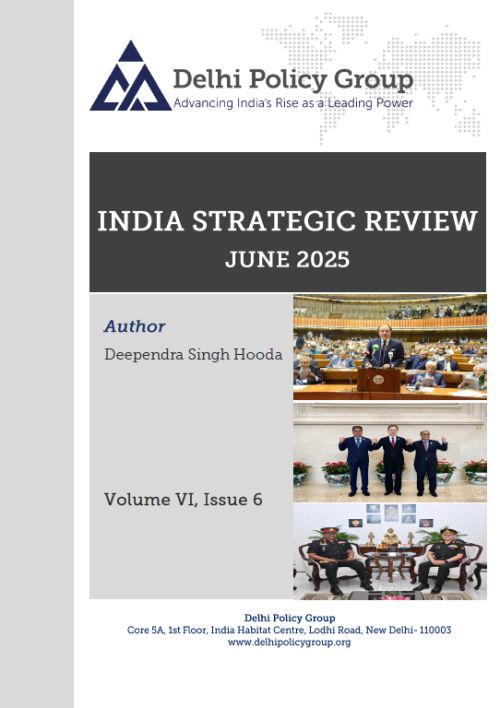India Strategic Review
Following Operation Sindoor, the ceasefire between India and Pakistan remains in place. Amidst a continuing freeze in diplomatic relations, India has reiterated that it has no plans to review its decision to hold the Indus Waters Treaty in abeyance.
Prime Minister Narendra Modi has responded strongly to US President Donald Trump’s repeated remarks claiming credit for the India-Pakistan ceasefire. In a telephone conversation with President Trump, he has also made it clear that India does not accept any third party mediation.
The Chief of the Pakistan Army, Field Marshal Asim Munir, was hosted for lunch by President Trump at the White House during his visit to the US. The meeting reinforced the perception that Pakistan’s military, rather than its civilian government, is the primary power centre in Pakistan. Pakistan has also nominated President Trump for the Nobel Peace Prize, though the move has faced domestic criticism.
Pakistan’s 2025–2026 budget reflects a 20% increase in defence spending, raising total defence-associated outlays to about 3% of GDP. Defence and debt servicing together consume the majority of the budget, while allocations for education and health remain limited.
In Afghanistan, regional engagement with the Taliban has progressed, particularly from the Central Asian states. Economic cooperation is growing, but the humanitarian situation remains severe, marked by significant gender disparities and declining levels of foreign aid.
At the Shanghai Cooperation Organisation Defence Ministers' Meeting in Qingdao, Indian Defence Minister Rajnath Singh, in a meeting with his Chinese counterpart, Admiral Dong Jun, called for faster progress on the boundary resolution. China emphasised the need for continued communication but signalled no commitment to a final resolution of the border issue.
In Bangladesh, tensions persist between the political parties and the interim government over the timing of the elections. On 19 June, the first trilateral summit between China, Pakistan, and Bangladesh was held in Kunming on the sidelines of the 6th China-South Asia Cooperation Forum. Dhaka sought to downplay the significance, stating that it was not building any alliances or targeting any third country.
India-Sri Lanka defence ties saw a boost with the 8th bilateral Defence Dialogue being held in Colombo and the visit of Sri Lanka’s Army Chief to India. India’s Mazagon Dock Shipbuilders acquired a controlling stake in the Colombo Dockyard, strengthening India’s strategic presence at the Colombo Port.
Nepal’s 2025-26 budget of USD 14.5 billion prioritises infrastructure development, green innovation, and hydropower investment. However, over 60% of the budget is committed to recurrent expenditures, leaving limited room for new capital projects.
To read this India Strategic Review, Vol. VI, Issue 6, please see the PDF attached.



